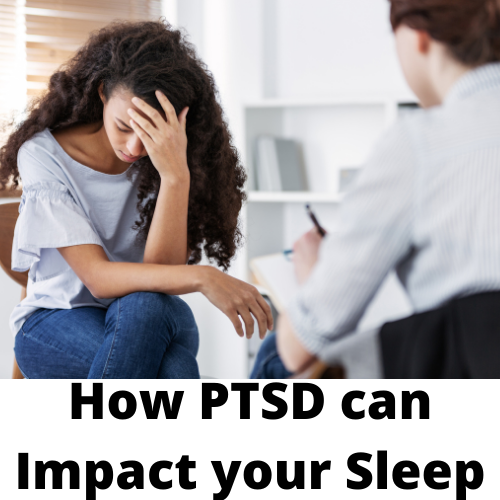Post-traumatic stress disorder, or PTSD, is a psychiatric disorder that stems from a traumatic event that is not resolved. This disease is slow and insidious, so many individuals may not know they have PTSD until months after the fact. Common individuals who experience PTSD are veterans, first responders, victims of violence, abuse, or major disasters. Women are more likely than men to experience PTSD, and about 70% of people will experience PTSD in their lifetimes.
PTSD results when someone experiences something extremely traumatic, and their brain rewires so that a certain stimulus leads to a negative reaction. This can manifest into nightmares, insomnia, depression, anxiety, hyperarousal, and many other symptoms. Continue reading to find out the interplay between sleep and PTSD.
How sleep issues affect PTSD symptoms.
Researchers are unclear if PTSD causes sleep issues or if sleep issues cause PTSD. What they have noticed, however, is that those who had sleep issues before a traumatic event have a worse manifestation of PTSD symptoms. So those who had nightmares or fragmented sleep before a stressful event, such as going to war, had worse sleep after experiencing their stress.
After individuals have experienced their stressful event and PTSD has settled in, they have an exacerbation of their symptoms. This may be because sleep deprivation that accompanies sleep disorders may make it harder for the brain to properly process emotions. In addition to this, those with PTSD may be self-medicated with alcohol or other substances, which can actually worsen sleep and therefore worsen PTSD symptoms.
How PTSD affects sleep issues.
Those with PTSD often have difficulty falling asleep. This may be due to nightmares, triggers, and other emotional disturbances that interrupt sleep efforts. They wake up many times throughout the night and often wake up feeling tired and unrefreshed.
PTSD is also associated with chronic pain, substance abuse, traumatic brain injury, and depression, all of which can negatively impact sleep. They simply cannot get peace of mind enough to fall asleep, or may be in such bodily pain that they cannot fall asleep.
Medications that these individuals take may also impact REM sleep. Rapid eye movement, or REM, sleep is an important stage for working out traumatic memories. If these individuals are constantly in a lighter stage of sleep, then they may not enter the stage, or stay there long enough, for appropriate emotion management.
The most common sleep complaints of those with PTSD are insomnia, nightmares or night terrors, and obstructive sleep apnea. All three of these disorders also lead to poor sleep.
The connection between the brain, PTSD, and sleep.
Researchers have found that there are multiple, overlapping brain regions involved in PTSD. PTSD, in conjunction with sleep disorders, leads to multiple problem areas like the hippocampus, amygdala, anterior cingulate cortex, and insular cortex. These are most likely responsible for patients reliving traumatic events over and over again, as well as the maintenance of a hyperarousal state.
Individuals with PTSD are also in a constant state of fight or flight, with faster heart rates while sleeping than what is considered average. This constant state of hypervigilance is counterproductive to sleep efforts. As the brain and body are supposed to be winding down, PTSD is turning everything on in preparation for danger.
Processing for these triggering emotions is supposed to happen during REM, so individuals can learn to better cope, but if REM sleep is interrupted or non-existent, then this processing never happens.
How to improve sleep with PTSD.
If you or someone you know with PTSD is having trouble sleeping, they are not out of options. Having proper sleep hygiene can help combat some of the effects of insomnia and PTSD. Sleep hygiene is your established sleep routine that is supposed to help coach your brain and body that it is time to go to sleep.
At the same time each day, start winding down for bed, doing the same activities. Humans are creatures of habit, and PTSD can make schedules irregular. By manually regulating your body and brain for sleep, you may have better luck.
PTSD is also a disorder that you should find resources or help to deal with the root problem. If you never address that, then you may not learn the process of working through really tough memories and emotions tied to PTSD.
If you or someone that you know continues to have sleep disruptions, please click the orange button below to take a free online sleep test and talk with one of our sleep health professionals.
Sources:
https://www.sleepfoundation.org/mental-health/ptsd-and-sleep


